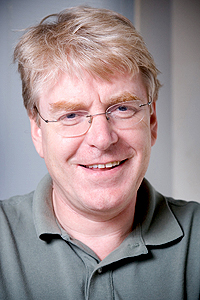![[Chronicle]](/images/sidebar_header_oct06.gif)
Vol. 26 No. 20
current issue
archive / search
contact
Past Opine interviews:
Lauren Berlant
Stephen Berry
John Boyer
David Cohen
Jerry Coyne
John Cunningham
Richard Epstein
John Frederick
Henry Frisch
Austan Goolsbee
Bernard Harcourt
Greg Jackson
Martin Marty
Martha Nussbaum
Raymond Pierrehumbert
José Quintáns
Jan-Marino Ramirez
Saskia Sassen
William Sewell
Herman Sinaiko
Geoffrey Stone
Cass Sunstein
Simon Swordy
Opine: Simon Swordy
 Simon Swordy (Photo by Jason Smith) | |
Simon Swordy, the James Franck Professor in Physics and the College, is a member of the VERITAS (Very Energetic Radiation Imaging Telescope Array System) collaboration. As a member of the collaboration, he is looking for evidence of gamma-ray emissions from the remnants of exploding stars. He recently has been named the Director of the Enrico Fermi Institute at the University.
What book should every person read and why?
I would recommend The Third Policeman by Flann O’Brien (a Dubliner). I was introduced to this book by some friends in college. This book contains alternative realities and plot lines, which are perfectly rational, but yet seem totally absurd. There is a great character in this book, de Selby, who performs various bizarre experiments many of which have seeming scientific plausibility—like using the speed of light to see backward in time, (much later, NASA used the same idea to describe the Hubble space telescope!). This book is short and fun, like many of the best things in life.
If you could meet any scholar, author, composer, musician or entrepreneur—dead or alive—who would it be and why?
This would have to be Newton, who produced most of the basic structure of what we now call physics whilst sheltering in the countryside from the plague as a young man in his 20s. Later in life he had what we now term a “nervous breakdown” and then went into government administration and devoted time to studying the Bible and exploring alchemy. Interestingly, during this period he determined the world would not end before 2060. Since he got so many things right, this should help us all sleep at night. I would hope to meet Newton, just for my own curiosity’s sake.
Among the complex moral and political issues that affect humanity, which do you believe will never be resolved and why?
If I were to go out and shoot somebody, I could easily be executed. But if I join the military and go off and shoot certain other people, I might get a medal. So “thou shalt not kill” has an exemption clause. This will probably never change.
If politicians had to pass an exam before they were allowed to serve in public office, what question would you add to the test?
This would have to be “do you really want a career in politics?” which would then likely disqualify most of the applicants.
If you could choose any three University professors and give them a one-year sabbatical together to solve a problem, develop a theory or make a discovery, who would they be and what task would you assign them?
Probably the biggest challenge we have as a nation is developing a democratic way of looking after ourselves. The current version of “Hippocrates meets Business Plans” is fine for the privileged but excludes a significant part of the population. So it would be good to have an academic view of ways to fix the healthcare business to throw into the current debate. I’ll have to punt on naming a contingent of professors; I know there are many out there who could make a good team for this effort.
Think of a renowned scholar from the past who added great value to your area of study. What would this person think of the advances that recently have been made in this field?
Robert Millikan won the Nobel Prize for establishing the charge of the electron at the University in the 1910s. He also coined the term “cosmic rays” for the high-energy radiation from space. He had a big scientific debate with [Arthur Holly] Compton in the 1930s about whether this radiation was charged particles or photons (electromagnetic radiation), which Millikan preferred. At the time, it was found that most of the radiation was charged particles. Much later we have determined that some of the high-energy radiation from space is, indeed, photons, and several telescopes have used these to view high-energy objects in our universe. I’m sure Millikan would be happy with that development.
What building on campus do you think is the most interesting architecturally and why?
I have to go with the Harper Library Reading Room, because I’m a traditionalist at heart, and that room really exudes learning.
Will a liberal arts education remain relevant to students in our increasingly technological society? Why or why not?
It is a mistake to view technology as an intrinsic threat to anything. In many ways it facilitates better understanding and research in all fields. It is just a question of learning how to use it, remember every incoming student is already an expert in YouTube. The values of the liberal arts will never be lost in our society because an appreciation for truth and beauty has survived through several thousand years of much greater turmoil than the arrival of e-mail capability for cell phones.
How will the next generation of scholars—today’s students—change your field in the decades to come?
Part of this will have to do with implementing the fruits of the increasing technological advances discussed above. The other is the secure knowledge that it will change. Some future paradigm is certain to supersede existing ideas.